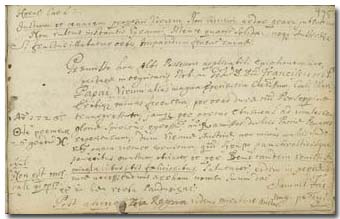
Horat[ius] Car[mina] L. 3.
Iustum et tenacem propositi Virum Non civium ardor prava jubentium
Non vultus instantis tyranni, Mente quatit solida: neque Auster
&c.
Si fractus illabatur orbis, Impavidum ferient ruinae.
Praemitto hoc Albi Possessori applicabili epiphonemate, spectatae
integritatis Nob[ilem] ac Pr[aes]t[antissim]um D. D[ominu]m
Franciscum P. Pápai, Virum alias magna experientia clariss[im]um.
Coeli Maris Erebique minas ferentem; per oras durae t[a]m[en]
Proserpinae transgressum; jamque per portas eburneas ad vitales
ceu gloriae spiritûs egressus, nuncque amissos dulcis Patriae
Penates reperiturum, dùm Viennae Austriae non minùs multis
sudoribus pacta virtute coruscum, q[ua]m Syrupo
panchresticisque panacibus onustum, obviaret, et per: Benè
tandem venisti Domine! avibus ibis faelicioribus salutaret; eidem in
perennaturae necessitudinis arrham nomen suum dat
Samuel Fáy Ung[arus] peregrinus
et in haec verba pandurisat:
Post aliquas Tua Regna videns mirabere aristas. *

[Sole premente 26 gradus Piscium]
Symb[olum]. Non est mortale quod opto. *
|
* Horace, Carmina 3.3.1-8. We have
included the English translation by John Conington. Also
quoted by H. G.
Certon on p. 393. *
A paraphrase of Virgil, Eclogae1.69: „Post aliquot, mea
regna, videns mirabor aristas?” In the English translation by
J. B. Greenenough: “shall I ever in aftertime … see many a
harvest hence … where I was a king?” *
A paraphrase of Ovid,
Metamorphoses 2.56: „Sors tua mortalis, non
est mortale quod optas.” In the English translation by Brookes
More: „For thou art mortal, and thou hast aspired to things
immortal.”
|
|
|
Horatius, Carmina 3.
The man of firm and righteous will / No rable, clamorous for the
wrong / No tyrant's brow, whose frown may kill, / Can shake the
strength that makes him strong / Not winds etc. / Should Nature's
pillar'd frame give way, / That wreck would strike one fearless
head. *
With this acclamation, very suitable to the
owner [of this album] I send forward the time-tested and
irreproachable noble Ferenc Pápai Páriz, illustrious with great
experience, who stood the menaces of heavens, sea and underworld,
has passed through the countries of the cruel Proserpina, and as
he had once entered through the ivory gates to the vivifying
spirits of glory, so is now heading for the abandoned protecting
spirits of the hearth of his home; and when, no less shining with
virtues acquired with great efforts than staggering under the
weight of a multitude of syrups, herbs and miracle medicines, on
his way home he met me in Vienna, I greeted him with “Welcome with
God, my sire! go with auspicious signs!”, and I have given to him,
as a token of our everlasting friendship, my name:
Sámuel Fáy,
Hungarian peregrinating student
and I sing to him on my lute:
You will see in aftertime many a harvest in your kingdom. *
In the year of 1726, when the Sun ascended
on the 26th degree of Pisces.
Motto: It is not mortal for what I aspire. *
|
p.
475. Vienna, March 16, 1726
Fáy,
Sámuel
(c. 1701-1760), Transylvanian
Reformed pastor
Sámuel Fáy (Fáji) was born around 1701 in Miriszló
(Alsó-Fehér county, today Mirăslău), the son of the local pastor
János Fáy. In 1715 he entered the upper classes in the College of
Nagyenyed (Aiud), then he went to study abroad. On May 14, 1726 he
immatriculated at the faculty of theology in Leiden, where he was
registered as an emissary of Nagyenyed (Coll[egii] al[umnus]). He
then settled in Leiden as a teacher, and died here on July 18,
1760. One source, however [Nánási 27] states him to have returned
in Transylvania, where he worked as a pastor. Two younger brothers
of him, János (c. 1705-1757) and József (1707-1771) also studied
abroad, and became pastors in Transylvania.
The memento of Sámuel Fáy is the latest one in the
album: it was written at the last station on the way back home of
the young Ferenc Pápai Páriz, in Vienna, on March 16, 1726. Fáy at
this time was setting out to his studies in Leiden. He dated his
note by the zodiacal calendar, using the symbols of the Sun (and
of the gold), and of the Pisces: “[at the time when] the Sun
entered the 26th degree of Pisces”. As the Sun makes the full
zodiacal circle of 360 degrees of the 12 signs in one year, thus
30 degrees fall to each zodiacal sign, each degree corresponding
to more or less one day. The Sun enters the sign of Pisces on
February 19, and therefore it reaches the 26th degree on March 16
(if the year is not bissextile, as 1726 was not). – This same
verse of Horace was also quoted in 1719 by Henri Gabriel Certon (p.
393). – The laudatory poems by Sámuel Fáy,
István Varga and József Harkányi are included in a wedding
print of Leiden of 1728. Varga wrote in the album in London in
1724 (p. 159), we give the bibliographical
data of the print at his name.
• AlbLeid 904 • Graaf •
Jakó-Juhász 132 • Nánási • Szabó-Szögi 163 • Weszprémi III 306 •
Zoványi-Ladányi 189 |

